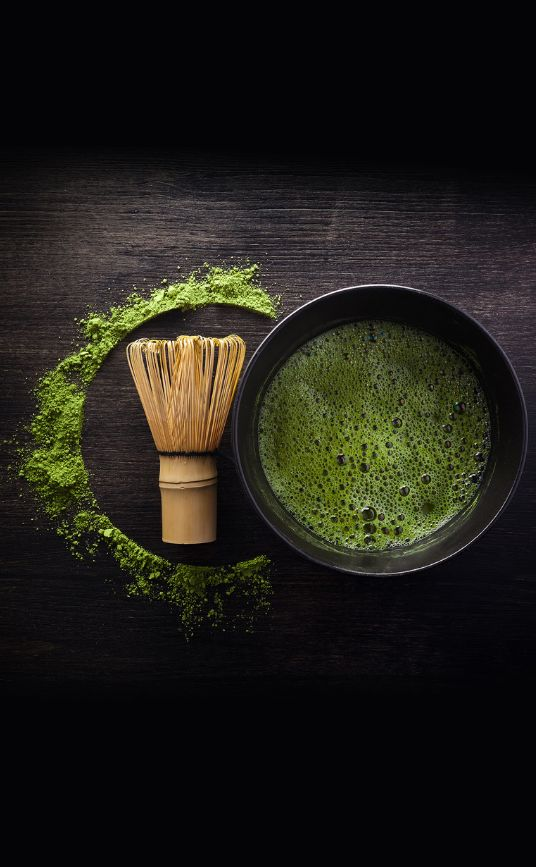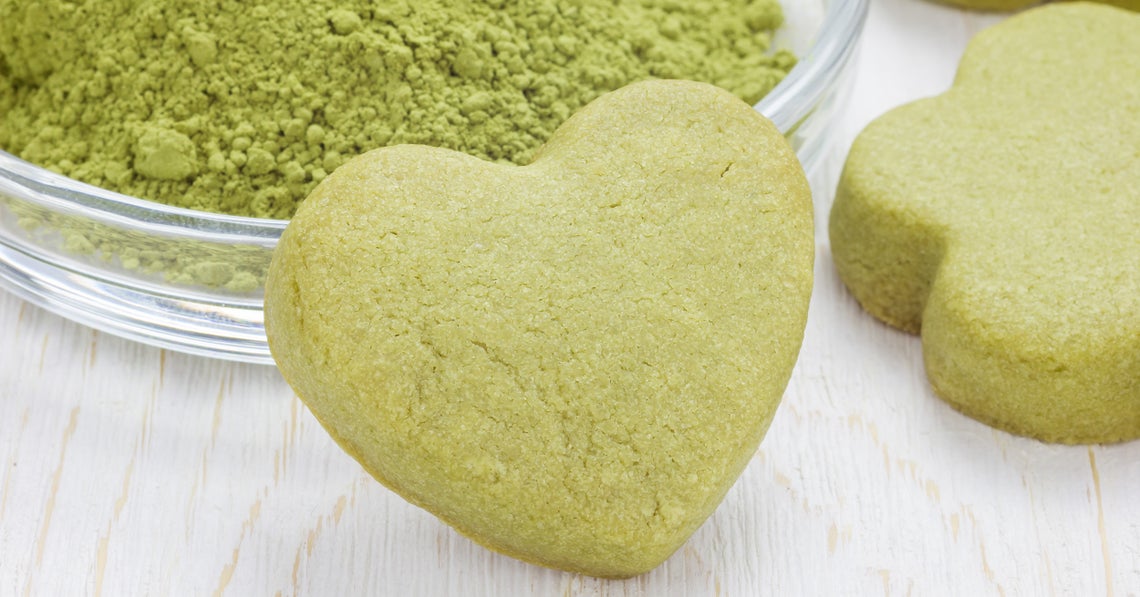Matcha, a special kind of green tea with a history steeped in age-old traditions, is quickly becoming a popular addition to modern-day recipes and health products everywhere. You can find matcha in cookies, cakes, and lattes of all sorts, but it’s more than just the newest trendy ingredient.
It’s clear that there is much more than meets the eye to this invigorating potion that holds the power to revitalize numerous aspects of well-being.
Let’s get to know this vibrant elixir that can bring you serenity and health. We’ll dig into why you need to make it a part of your health routine and unravel the enchanting qualities of this beloved beverage.
What Is Matcha?
Matcha comes from the same plant as black tea, white tea, and of course, green tea, Camellia sinensis. What makes it different from the others is the meticulous way it’s cultivated and processed.
Every aspect of the production of matcha is done with intention and purpose. From the very soil it is grown into the time of year it is harvested, every step is carefully planned and determined by tradition and the experience of generations.
Because of the special growing techniques and the way it is preserved, high-quality matcha magnifies the benefits of green tea and can contribute to:
♦ Long-lasting daily energy
♦ Focus and concentration
♦ Mental health support
♦ Cellular health
♦ Hormonal health
♦ Healthy teeth and gums
♦ Feelings of well-being and overall vitality
What Makes Matcha Different From Other Kinds of Tea?
Most matcha is grown in Japan and has roots that reach deep within Japanese culture. As the centerpiece of the traditional Japanese tea ceremony, it has a sacred place in many people’s lives.
While some varieties of tea are fermented, aged, or oxidized, matcha is processed in a way that preserves the bright green color of the tea leaves. These careful methods also protect the healthful compounds in the tea that are so well-known for their health benefits.
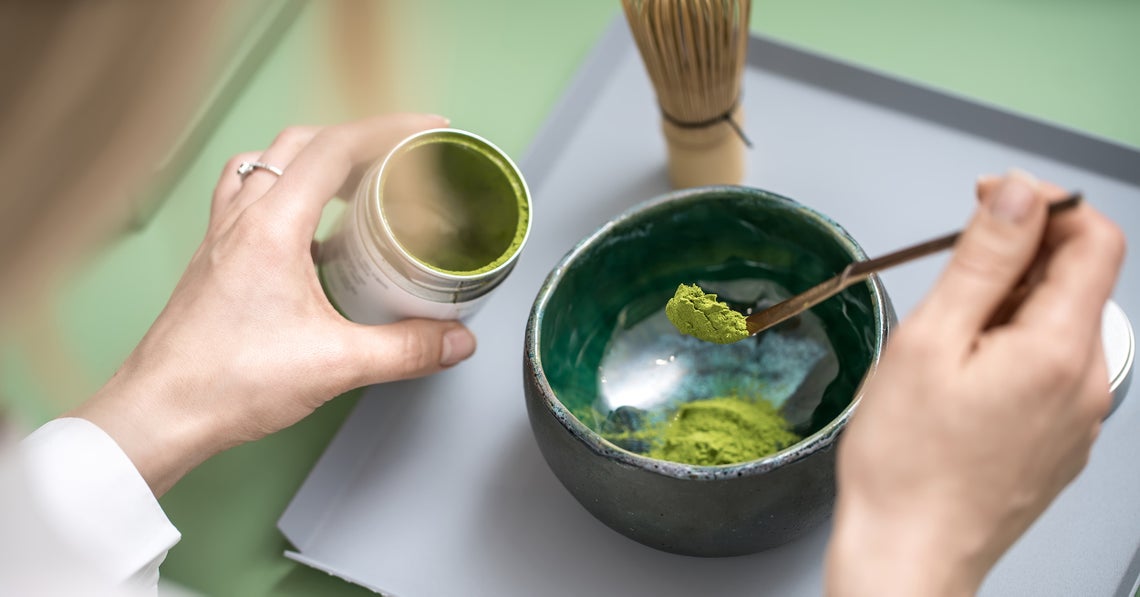
Unique features of matcha include:
♦ It comes in a powdered form and has a unique preparation method that results in more potency than a typical tea infusion.
♦ Only the young leaves are harvested after a period of being shaded to encourage the rise of chlorophyll through the plant. This accentuates the levels of nutrients.
♦ Traditional matcha is stone ground, which keeps plant matter at a cool temperature and makes it into a superfine powder. This results in the powder being smooth and silky when whisked into hot water.
♦ Matcha typically has higher levels of key antioxidants and nutrients, such as vitamin C, catechins, lutein, and L-theanine, when compared to other teas.
♦ Matcha usually has a more complex flavor than other teas.
♦ There are different grades of matcha. The ceremonial grade is the highest quality, has the sweetest flavor, and is considered to be the most potent.
Matcha Nutrition
Matcha’s impressive nutritional profile and powerful health benefits make it an exquisite way to enhance overall health and beauty.
Nutrients and healthful substances found in matcha include:
♦ Caffeine. Helps to strengthen brain function and may benefit heart health in moderation.
♦ L-theanine. Beneficial for supporting mental health, quality sleep, immune health, and promoting relaxation.
♦ EGCG (epigallocatechin gallate). EGCG has been studied extensively and has shown promise as a neuroprotective and cardioprotective compound. It also supports the immune system, benefits the skin, and supports the gut microbiome.
♦ Polyphenols. Matcha contains a generous amount of polyphenols, including catechins, flavonoids, and phenolic acids, which have impressive benefits that support long-term health.
♦ Lutein. This is a carotenoid that benefits eye health, heart health, and cognitive function.
♦ Vitamin K. This vitamin is well known for its role in healthy blood clotting and is also essential for nervous system cell health.
♦ Quercetin. It supports immune and cardiovascular health, assists with immune system regulation, and reduces common oxidative stress.
♦ Chlorophyll. This is a green pigment found in plants and is especially present in matcha. It helps the body with daily detoxification and benefits cell health.
♦ Potassium. Supports kidney and bone health and helps to keep fluids regulated within cells and throughout the body.
♦ Beta-carotene. It provides nutritional support for beautiful skin, eye health, brain health, and immune health.
♦ Vitamin C. Matcha contains more than double the amount of vitamin C when compared to other green teas. This makes matcha a great option for added antioxidants, immune health, and supporting the formation of collagen.
♦ Fiber. This benefits the cardiovascular system, blood sugar levels, and gut microbiota.
Health Benefits of Matcha
Supports Heart Health
Your heart will love the wide range of benefits that matcha provides. A daily cup of matcha can provide plentiful EGCG and other catechins. These help to keep the vascular cells healthy and reduce common oxidative stress within the cardiovascular system. Matcha also helps maintain healthy ranges of blood pressure and cholesterol and keeps platelets flowing smoothly.
Strengthens the Immune System
By providing nutritional support for immune cells, matcha is a great friend to our immune system. Matcha and green tea help to protect us from seasonal threats that can slow us down. The powerful polyphenols found in matcha, plus added nutrients like vitamin C, help our body to maintain immune function.
Quercetin, a powerful compound found in matcha, is known for its unique properties that help with immune system regulation. L-theanine also has some surprising immune benefits, including enhancing intestinal and innate (our defensive) immunity. And, of course, EGCG has something to offer, too, helping to regulate the production of T-cells and enhancing protective immune activity.
Supports Healthy Skin
Matcha is big in the beauty industry and can be found in skincare serums, creams, masks, and cleansers. Topical use helps to reduce the appearance of fine lines and other common signs of aging, but so does drinking it. Consuming matcha can help to reduce the effects of daily sun exposure and benefits keeping skin tone clear and even.
The potent compounds in matcha support microcirculation, helping to bring nutrients and oxygen to the skin. Since matcha also helps support the immune system and microbiome, it has several pathways linked to clear, healthy, and youthful-looking skin.
Promotes Normal Detoxification and Aids Digestion
The robust antioxidants found in matcha are incredible for helping the body handle everyday oxidative stress. Slowing down oxidation reduces the load put on your liver and other detoxification organs.
EGCG has specific properties that protect the liver, promoting its health and function. It also supports enzymes involved in phase II detoxification processes that help remove metabolic wastes from the body.
The slightly bitter flavor of matcha activates the release of digestive juices, promoting digestive function and helping the liver do its job. Another thing you get with matcha that won’t be in your typical cup of tea is the fiber content. This, along with EGCG and other compounds, supports healthy gut bacteria, promoting diversity within the microbiome.
Enhances Cognitive Function, Focus, and Mental Clarity
Adding matcha to your morning routine can help you spend your day in an ideal balance of uplifted energy paired with a touch of serenity.
L-theanine offers extraordinary calming properties that help to balance out the effects of caffeine. The combo results in a wondrous, relaxed, and alert feeling that helps you stay focused and productive without feeling overwhelmed.
Matcha is a great meditation partner and has been used historically for this very purpose.
The catechins in matcha give it neuroprotective properties, and it’s a great preventative for slowing down age-related cognitive decline. Matcha’s vitamin K content supports neuron cell growth and glial cells in the brain, helping to keep brain tissues healthy.
The potent mixture of compounds found in matcha makes it great for supporting many aspects of brain activity, including concentration, memory, and attention.

Promotes Metabolic Health and Assists in Weight Management
Along with a healthy diet and exercise, regularly drinking matcha can be a great addition to a weight management program. Caffeine is a common tool to support energy, reduce everyday cravings, and keep up your metabolic rate. But matcha goes even further than other sources of caffeine.
Green tea extracts have been shown to support leptin production, a hormone that regulates hunger and influences the way calories are used for energy. In addition, EGCG and other phenolic compounds found in matcha help to metabolize fats and carbohydrates.
It also has nutritional effects that support the gut-liver axis, helping to pave the way for healthy interactions between the liver and gut microbiome. This may be the foundation for the beneficial effects matcha has on metabolic health. It has been shown to help regulate blood sugar levels and can have beneficial effects on insulin sensitivity.
Reduces Everyday Stress and Promote Healthy Moods
Our mental health affects every aspect of our lives, and matcha can be a daily ritual that keeps your mind healthy in several ways. It can bring a meditative moment into your day when sipped with awareness, but the compounds found in matcha can also contribute to mental health.
Of course, caffeine can give you a little pick-me-up, but on its own, it can sometimes aggravate tension and everyday stress. With the bonus of having L-theanine, matcha provides an invigorating feeling counterbalanced with a calm sense of serenity.
L-theanine also enhances the quality of sleep, helps regulate emotions, and supports a healthy balance of serotonin and dopamine. Another compound found in matcha that can have typical stress-reducing effects is arginine, which can assist in maintaining a peaceful state of mind.
Potential Side Effects and Precautions
It is best to use matcha in moderation. Some people may be sensitive to the caffeine content, which can interfere with sleep and cause agitation in high doses. Because it is so potent, it may be best to start with small amounts to see how you respond.
If you are pregnant or nursing, talk to your doctor before using matcha. While matcha and green tea are not considered harmful, caffeine does cross the placenta and can pass through breast milk.
People with certain medical conditions may need to avoid it or use caution when consuming matcha. If you are on medications that affect blood sugar, blood pressure, or blood clotting, consult with your doctor before trying matcha.
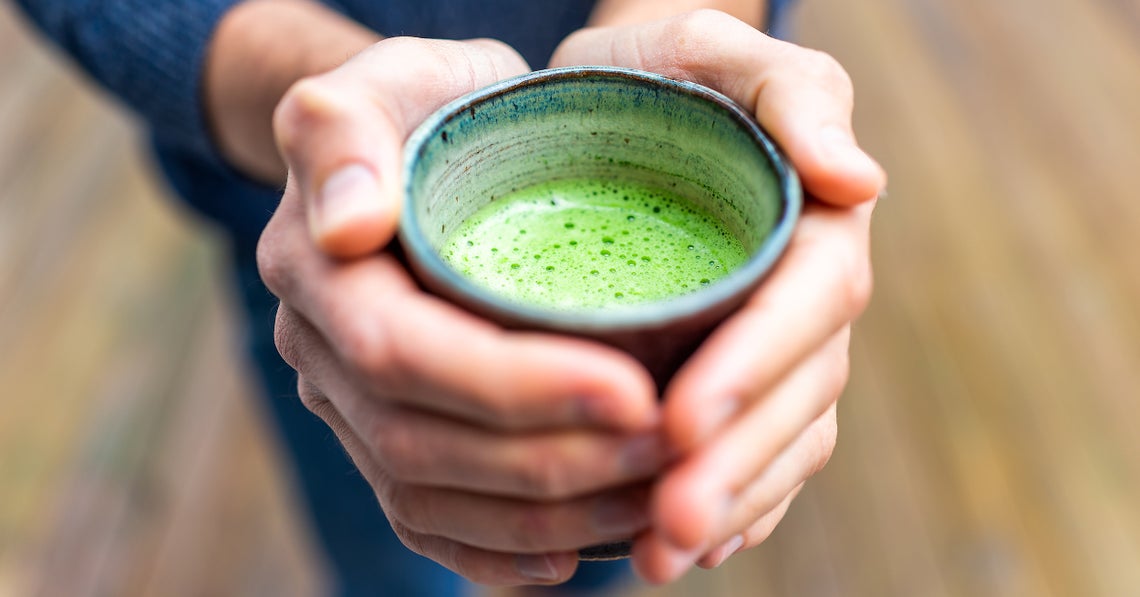
Awaken to Wellness
Matcha holds the essence of mindfulness, and having a cup gives us a chance to tune into our inner world. One thing that is very clear is that matcha is powerful. It has incredible potential for awakening our health on a deeper level. We’ve included matcha in our Beyond Greens® daily drink mix so you can enjoy the benefits of matcha along with a consciously crafted blend of superfoods and functional mushrooms.
You can whisk it up like traditional matcha or use it in a variety of smoothies, breakfast foods, baked goods, and plenty of other recipes. Our Beyond Greens® formula was created with the intention of uplifting our minds and nourishing our bodies, and matcha is a foundational part of that mission.
Matcha F.A.Q.
What are the different ways to use matcha besides tea?
It’s fun to experiment with matcha, and you can add it to lattes and smoothies, sprinkle on oatmeal or yogurt, bake with it, and even add it to popsicles or ice cream. Try our Matcha Chia Pudding or these invigorating Beyond Greens® Matcha Crepes to get started. Get creative and try adding matcha to your favorite cookie, cake, or other dessert recipe for an uplifting twist that will provide additional health benefits.
What are the different grades of matcha?
Different suppliers of matcha may provide various grades and subgrades, but they are usually divided into two main categories: ceremonial and culinary.
Ceremonial is the highest quality and is taken from the first harvest of the young leaves in spring. The first flush of leaves is the most precious and has a more delicate flavor. Ceremonial matcha is the most expensive grade and is usually reserved for traditional preparations or tea ceremonies.
Culinary matcha, or food-grade matcha, can still be very high quality but less expensive than the ceremonial grade. It can also be prepared in the traditional way but is usually found in a variety of foods and beverages. The leaves may be picked later in the year, often in the summer, giving them different qualities.
Some varieties of culinary matcha may be darker in color, can be more bitter, and may have a more pronounced grassy flavor, but that will depend on the supplier. You can find excellent culinary matcha that is high quality with a delightful flavor, so you may want to try a few different kinds to find the one you like best.
Can I drink matcha if I am pregnant or breastfeeding?
This is a great question to ask your doctor. It is important to minimize caffeine in pregnancy, and in certain cases, it may need to be avoided altogether. If you are breastfeeding, talk with your pediatrician to get their advice about matcha or caffeine.
Because caffeine can pass through breast milk, it might be best to avoid it until you have established a good sleeping schedule. If your doctor approves, you can start with small amounts and see how it affects your child.
Does matcha interact with medications or other supplements?
Yes, matcha can affect the way your body metabolizes certain medications. Be sure to ask your doctor about using matcha if you are on any medications, especially those related to blood sugar, blood pressure, and blood clotting. Certain people may be more affected than others.
If you are taking supplements with iron, matcha can limit the amount of iron that is absorbed by the body. Talk to your doctor if this is a concern for you.
How much caffeine is in matcha?
The amount of caffeine in your cup of matcha will depend on how strong you make it. If you use ½ teaspoon of matcha, it will usually be around 40-50 mg of caffeine. When using a teaspoon of matcha, it will usually be around 80-100 mg of caffeine.
Of course, caffeine content can vary, depending on the quality and strength of your matcha. Higher ranges of caffeine found in matcha could be anywhere from 88 mg (½ teaspoon) to 177 mg (1 teaspoon). Also, remember that if you purchase matcha at a coffee shop, it could be prepared much stronger and could have varying amounts of caffeine.
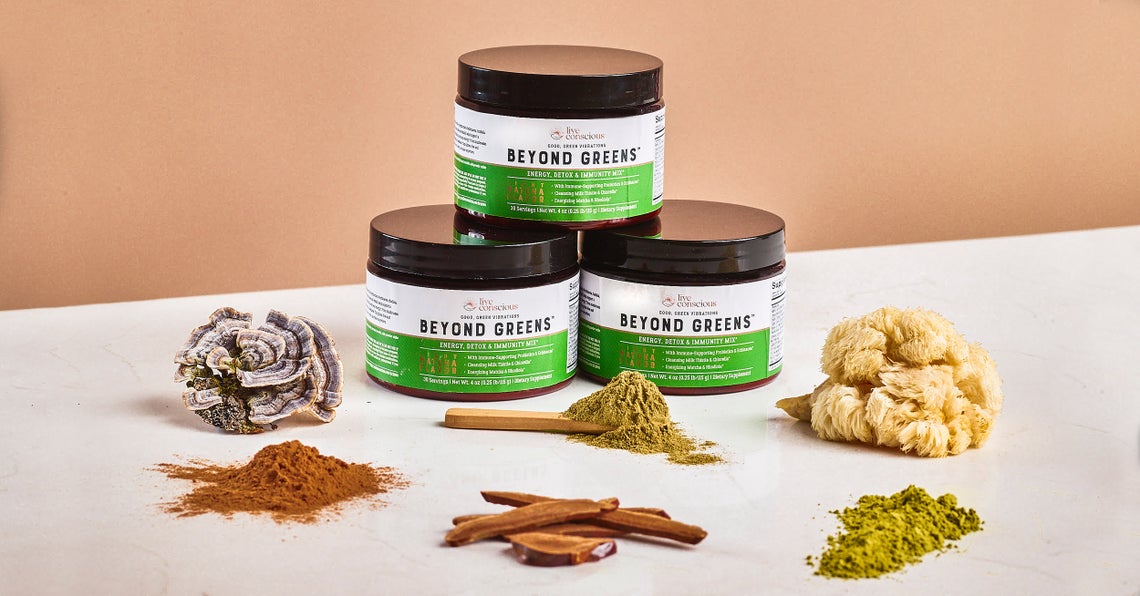
How is matcha different from green tea?
Matcha is a type of green tea, but it is grown, harvested, cleaned, dried, and ground in special ways to enhance and preserve the nutritional value of the plant. For matcha tea, powdered leaves are used rather than steeping the leaves in hot water. This preparation method results in a more potent elixir containing all the compounds in higher concentrations than you get when you drink other kinds of tea.
How do I make a matcha latte?
It’s easy to make your own matcha latte at home with a few simple ingredients. Here is our favorite recipe for an Iced Matcha Latte.
1 teaspoon matcha powder
1 scoop Beyond Greens® powder
1 tablespoon of milk of choice
Whisk vigorously until well combined and slightly frothy.
Fill a small glass or mug with ice.
Add 1 cup of milk (we like almond or oat milk).
Add matcha and Beyond Greens mixture.
Add 1 tablespoon of vanilla syrup or maple syrup.
Stir and enjoy!
If you prefer a hot drink, simply skip the ice and use hot milk for a cozy matcha latte.




